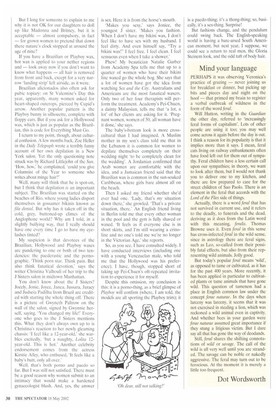Mind your language
PERHAPS it was observing Veronica's practice of grazing — never joining us for breakfast or dinner, but picking up bits and pieces day and night on the hoof — that primed my brain to register a verbal outbreak of wildness in the form of the word feral.
Will Hutton, writing in the Guardian the other day, referred to 'increasingly feral forms of capitalism'. Lots of other people are using it too; you may well come across it again before the day is out. I think a reason for its popularity is that it implies more than it says. I mean, feral cats living on railway embankments often have food left out for them out of sympathy. Feral children have a less certain call upon our sympathies; in theory, we want to look after them, but I would not thank you to deliver one to my kitchen, and there are few prepared to care for the street children of Sao Paolo. There is an element in the feral that accords with the Lord of the Flies side of things.
Actually, there is a word feral that has not survived in current use, and it refers to the deadly, to funerals and the dead, deriving as it does from the Latin word with this meaning, feralis. Thomas Browne uses it. Even feral in this sense has cross-infected feral in the wild sense, since in astrology there are feral signs, such as Leo, so-called from their possibly fatal effects, but also from their representing wild animals. Jolly good.
But today's popular feral means 'wild', as opposed to tame or cultivated, as it has for the past 400 years. More recently, it has been applied in particular to cultivated plants or tame animals that have gone wild. This question of tameness had a place in English common law under the concept ferae naturae. In the days when larceny was larceny, it seems that it was not exercised in stealing a lion, which was reckoned a wild animal even in captivity. And whether bees in your garden were ferae naturae assumed great importance if they stung a litigious victim. But I dare say all that has gone the way of deodands.
Still, feral shares the shifting connotations of wild or savage. The call of the wild is all very well until you are stranded. The savage can be noble or nakedly aggressive. The feral may turn out to be ferocious. At the moment it is merely a little too frequent.
Dot Wordsworth














































































 Previous page
Previous page